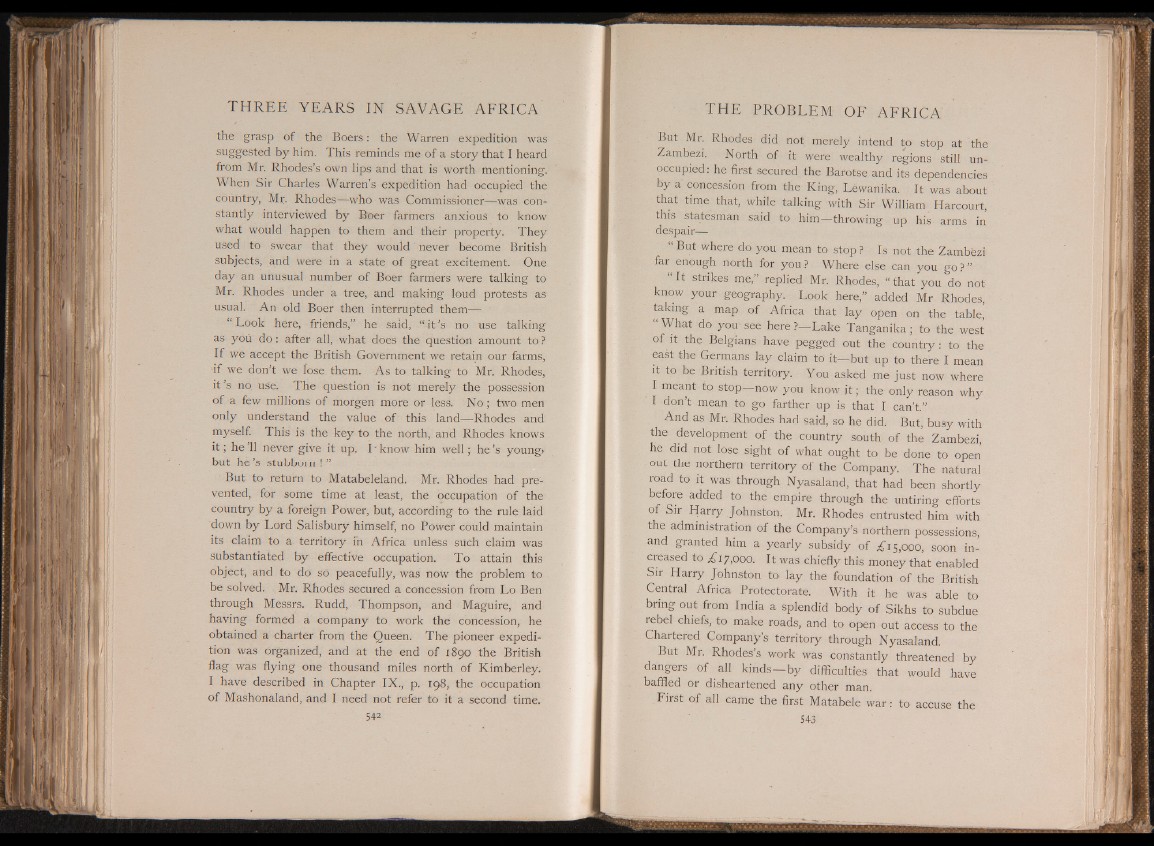
the grasp of the Boers: the Warren expedition was
suggested by him. This reminds me of a story that I heard
from Mr. Rhodes’s own lips and that is worth mentioning.
When Sir Charles Warren’s expedition had occupied the
country, Mr. Rhodes—who was Commissioner-—was constantly
interviewed by Boer farmers anxious to know
what would happen to them and their property. They
used to swear that they would never become British
subjects, and were in a state of great excitement. One
day an unusual number of Boer farmers were talking to
Mr. Rhodes under a tree, and making loud protests as
usual. An old Boer then interrupted them—
“ Look here, friends,” he said, “ it ’s no use talking
as you do: after all, what does the question amount to?
If we accept the British Government we retain our farms,
if we don’t we lose them. As to talking to Mr. Rhodes,
it ’s no use. The question is not merely the possession
of a few millions of morgen more or less. No; two men
only understand the value of this land—Rhodes and
myself. This is the key to the north, and Rhodes knows
i t ; he ’11 never give it up. I ' know him well; he’s young)
but he’s stubborn ! ”
But to return to Matabeleland. Mr. Rhodes had prevented,
for some time at least, the occupation of the
country by a foreign Power, but, according to the rule laid
down by Lord Salisbury himself, no Power could maintain
its claim to a territory in Africa unless such claim was
Substantiated by effective occupation. To attain this
object, and to do so peacefully, was now the problem to
be solved. Mr. Rhodes secured a concession from Lo Ben
through Messrs. Rudd, Thompson, and Maguire, and
having formed a company to work the concession, he
obtained a charter from the Queen. The pioneer expedition
was organized, and at the end of 1890 the British
flag was flying one thousand miles north of Kimberley.
I have described in Chapter IX., p. 198, the occupation
of Mushonalahd, and I need not refer to it a second time.
542
But Mr. Rhodes did not merely intend to stop at the
Zambezi. North of it were wealthy regions still unoccupied:
he first secured the Barotse and its dependencies
by a concession from the King, Lewanika. It was about
that time that, while talking with Sir William Harcourt,
this statesman said to him—throwing up his arms in
despair—-
“ But where do you mean to stop ? Is not the Zambezi
far enough north for you ? Where else can you go ? ”
“ It strikes me,” replied Mr. Rhodes, “ that you do not
know your geography. Look here,” added Mr Rhodes,
taking a map of Africa that lay open on the table,
“ What do you' see here ?—Lake Tanganika; to the west
of it the Belgians have pegged out the country: to the
east the Germans lay claim to it—but up to there I mean
it to be British territory. You asked me just now where
I meant to stop—now you know i t ; the only reason why
I don’t mean to go farther up is that I can’t.”
And as Mr. Rhodes had said, so he did. But, busy with
the development of the country south of the Zambezi,
he did not lose sight of what ought to be done to open
out the northern territory of the Company. The natural
road to it was through Nyasaland, that had been shortly
before added to the empire through the untiring efforts
of Sir Harry Johnston. Mr. Rhodes entrusted him with
the administration of the Company’s northern possessions,
and granted him a yearly subsidy of £15,000, soon increased
to £17,000. It was chiefly this money that enabled
Sir Harry Johnston to lay the foundation of the British
Central Africa Protectorate. With it he was able to
bring out from India a splendid body of Sikhs to subdue
rebel chiefs, to make roads, and to open out access to the
Chartered Company’s territory through Nyasaland.
But Mr. Rhodes’s work was constantly threatened by
dangers of all kinds—by difficulties that would have
baffled or disheartened any other man.
First of all came the first Matabele war: to accuse the
543